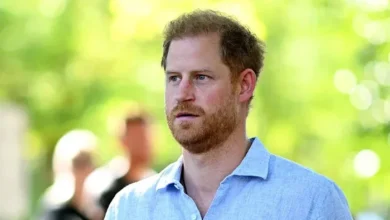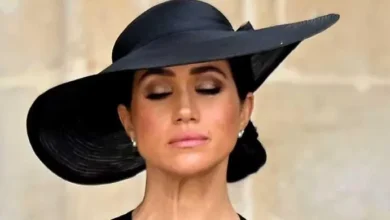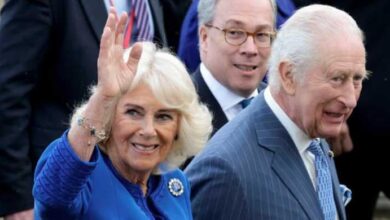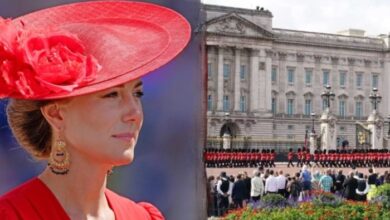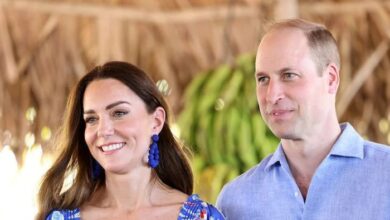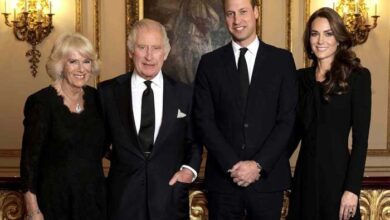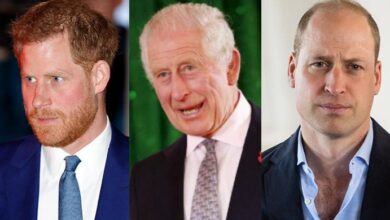Meghan Markle Reveals Tragic Truth About Princess Lilibet Life

In a recent appearance at the Afro Women and Power Forum, Meghan Markle, the Duchess of Sussex, opened up about a significant development in her daughter, Princess Lilibet’s life.
The revelation has sparked a wave of reactions and discussions, shedding light on what some are calling a “great tragedy” within the royal family.
During her speech, Meghan proudly shared that Lilibet, her youngest child with Prince Harry, has “found her voice.”
This statement, while seemingly a proud parental observation, has led to broader conversations about Lilibet’s place within the royal family, particularly her relationship—or lack thereof—with her royal grandparents.
Meghan’s comments about Lilibet finding her voice were delivered with a sense of pride and hope for the future.
“We’re so proud of that,” Meghan said, “because that is how we create the conditions in which there’s a ripple effect of young girls and young women knowing that someone else is encouraging them to use their voice and be heard.”
This sentiment reflects Meghan and Harry’s ongoing commitment to empowering young people, particularly young women, to speak out and be agents of change.
However, the underlying context of Lilibet’s emerging voice has also brought attention to the broader implications of her upbringing away from the royal family.
Michael Cole, a seasoned royal commentator, offered a poignant reflection on the significance of Meghan’s words.
According to Cole, while it’s wonderful that Lilibet is finding her voice, there’s a tragic element to her story: the absence of a relationship with her royal grandfather, King Charles III, and her maternal grandfather, Thomas Markle.
“She won’t be saying ‘hello Grandpa!’ to King Charles,” Cole remarked during a segment on GB News.
“That’s a great, great tragedy, because she hasn’t met King Charles, she hasn’t met Thomas Markle, her maternal grandfather—it’s such a shame.”
Cole’s comments underscore the emotional and symbolic weight of Lilibet’s situation. Despite being born into one of the most famous families in the world, she has yet to meet two of her grandfathers, a reality that many find heartbreaking.
The strained relationships between Meghan and her father, and between Prince Harry and his royal relatives, have resulted in a situation where Lilibet, and her older brother Archie, are growing up without direct ties to their grandparents on either side.
While Meghan and Harry have distanced themselves from the royal family, they have channeled their energies into global causes, particularly those that resonate with their personal values and experiences.
Their recent trip to a South American country, where they focused on the issue of online harm for children, is a testament to their dedication to creating a safer and more just world for young people.
During their visit, the couple spoke passionately about the dangers that children face online and the importance of addressing these challenges.
This advocacy work aligns with their broader mission to protect and empower the next generation, a mission they seem intent on passing down to their children.
However, as Cole pointed out, while their global efforts are commendable, there remains a glaring disconnect in their personal lives.
“They go around the world and they’re trying to do good, and we welcome the good,” Cole said. “But you’ve got to actually take that home.
If they can’t make bridges within their own family, then what hope have they got in making bridges to other communities, other faiths, and other beliefs?”
Cole also took the opportunity to critique Meghan and Harry’s decision to step back from royal duties and life in the UK.
Read More: Prince Harry Inspires Wicked Stepmother Queen Camilla to Make Major Decision
He suggested that had Meghan chosen to embrace the “wider stage and the bigger stage that Buckingham Palace could have given her,” she could have been a tremendous asset to the royal family.
Instead, the couple’s decision to relocate to Canada and subsequently to the United States marked a definitive departure from their roles as senior royals.
For many royal watchers, this choice has been a source of ongoing debate. While some admire the Sussexes for forging their path, others, like Cole, lament the lost potential of what they could have contributed within the framework of the royal institution.
As Meghan and Harry continue to navigate their lives outside of the royal spotlight, the question remains: how will this path shape the futures of Lilibet and Archie?
While the couple is undoubtedly committed to providing their children with a loving and supportive environment, the absence of close familial ties with their royal relatives is a significant aspect of their upbringing.
The “great tragedy” that Cole highlights is not just about missed opportunities for Lilibet to know her grandfathers but also about the broader implications of a fractured family.
As Lilibet grows up, the stories and decisions of her parents will inevitably shape her understanding of her place in the world, both as a member of a famous family and as an individual finding her voice.
In the end, while Meghan’s revelation about Lilibet’s newfound voice is a moment of joy and pride, it also serves as a reminder of the complex and often painful realities that come with life as a Sussex—realities that will undoubtedly continue to unfold in the public eye.
